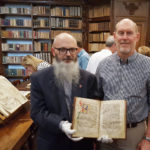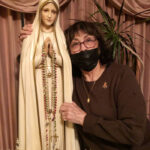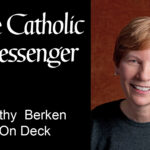When Pope Francis asked every parish and religious community in Europe to accept a refugee family fleeing from war and poverty, he knew the response had to engage a community. Imagine the sense of loss these displaced people, mostly Syrians, feel as they work to rebuild their lives in a different culture, learning a new language, while grieving the loss of loved ones, their livelihoods and homes.
Nearly half of Syria’s pre-war population of 23 million has been displaced by the civil war, internally or externally, according to MercyCorps (www.mercycorps.org). The majority of Syrians who fled are now living in two countries, Lebanon and Jordan, which are strained to the breaking point. A coordinated global response to this crisis is essential. The U.S. ought to play a leadership role because we have the resources to do so.
Since 2011, the U.S. has taken in about 1,500 Syrian refugees, a miniscule amount by any standard. On Sept. 10, President Obama committed to accepting 10,000 Syrian refugees in the fiscal year that begins in October. While processing of refugees takes time, we should advocate for increasing that quota to be proportionate to the response of other countries of our means. That figure is estimated at 65,000.
Archbishop Joseph Kurtz, president of the U.S. Conference of Catholic Bishops (USCCB), declared Sept. 10 that the U.S. Catholic Church stands ready to help. He called for openness and a welcoming attitude toward refugees who are fleeing Syria and elsewhere in order to survive.
So how do we stand ready to help? For starters, contribute to the special collection that Bishop Martin Amos has requested to take place this weekend (Sept. 19-20) in all parishes in the Davenport Diocese. The money will go to Catholic Relief Services’ (CRS) efforts in assisting the refugees.
Next, visit the CRS websites www.crs.org / www.crsespanol.org and read the list of seven things you can do to help. Ideas range from learning more about the refugee crisis and what precipitated it to praying, donating and advocating for U.S. leadership in working to end the fighting in Syria.
For many of us it is distressing to see the mass exodus of displaced people, and to see the dead body of a sweet-faced toddler on the shore causes a twinge in our hearts. Maybe we thought about offering the spare bedroom in our home to a refugee family. That’s probably unrealistic, which is why the pope called for a parish, a religious community — not a parishioner — to take in a refugee family.
Years ago, parishes within our Davenport Diocese sponsored Vietnamese refugees who resettled and have flourished in our diocese and elsewhere. By the late 1980s, the diocese’s Refugee Resettlement Office had taken over the resettlement responsibilities. A new wave of refugees arrived in the 1990s from Bosnia, Serbia, Croatia and Kosovo. Nora Dvorak led that office in the 1990s, and it was recognized at the national level for excellence.
The diocese no longer has the financial resources to support a Refugee Resettlement Office, but a parish or a cluster of parishes could assist refugee families through other organizations, such as the Bureau of Refugee Services in Iowa. Nora says networking with a community’s “infrastructure” (schools, churches, hospitals, employment offices, etc.) would be essential.
She remembers the generous response of parishioners toward refugees during her tenure in refugee resettlement and encourages more of the same.
It’s worth noting here that the USCCB views refugee resettlement as “an extraordinary opportunity for countless Americans to take an active part in offering a caring and supportive environment for refugees as they begin their new lives.”
And we can’t overlook the contribution of the refugees themselves. Nora was struck by the gifts of faith, intelligence, resourcefulness, culture and family loyalty that previous refugees brought to the table in the Davenport Diocese. We can take that to prayer, to our parish council meetings and our own families as we consider our response to Pope Francis’ call.
Barb Arland-Fye











